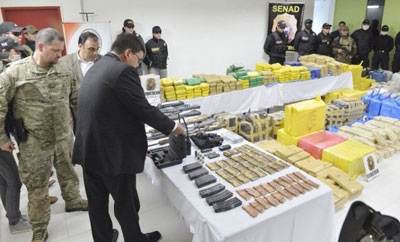Paraguayan authorities have found indications that the country’s EPP guerrilla movement receives arms from drug traffickers with international connections, strengthening the rumors of narco-guerrilla links that have been circulating for some time.
On August 22, Paraguayan police seized over 1.8 tons of cocaine, arrested five people and dismantled a group that flew cocaine from Peru and Bolivia to estates in Paraguay’s central Presidente Hayes and Concepcion departments, reported Sipse. They also found a “large quantity” of firearms, as well as clandestine landing strips.
Investigators from the country’s anti-drug unit, SENAD, believe the guerrillas of the Paraguayan People’s Army (EPP) were providing protection to these drug traffickers in exchange for arms, reported ABC. Workers from the properties at which the seizures took place said men in camouflage uniforms had visited their bosses on a number of occasions. Firearms seized also included AK-47s and FAL rifles of the same kind used in the recent deadly attack in the neighboring San Pedro department, which has been widely attributed to the EPP.
In an interview with Canal 100, Paraguay’s new anti-drug czar, Luis Rojas, said the marijuana plantations and clandestine landing strips found in the EPP’s area of influence were two other important indicators of narco-guerrilla connections.
InSight Crime Analysis
In recent years, there have been persistent accusations levelled at the EPP that they are involved in drug trafficking and some have even claimed the rebels are not a real insurgency, but rather a front for criminal groups involved in drug trafficking.
Recently, the accusations have been mounting. In July, police claimed marijuana plantations found in the EPP territory in San Pedro was evidence of guerrillas’ links with the drugs trade. More recently Rojas said the EPP may charge taxes to drug traffickers cultivating in their area of influence.
It is likely that the EPP is capitalizing on Paraguay’s popularity as a transhipment point for Brazilian-bound Bolivian and Peruvian cocaine and status as the region’s leading marijuana producer. Nonetheless, the government’s focus on the group — which probably represents a much smaller threat than criminal groups operating in the country’s tri-border area — could be a convenient political strategy for President Horacio Cartes, who himself has been accused of narco ties.
Links between drug trafficking and insurgencies in Latin America have long been established in Colombia and Peru, where the Revolutionary Armed Forces of Colombia (FARC) and Peru’s Shining Path have both funded their struggle with drug trade profits.

